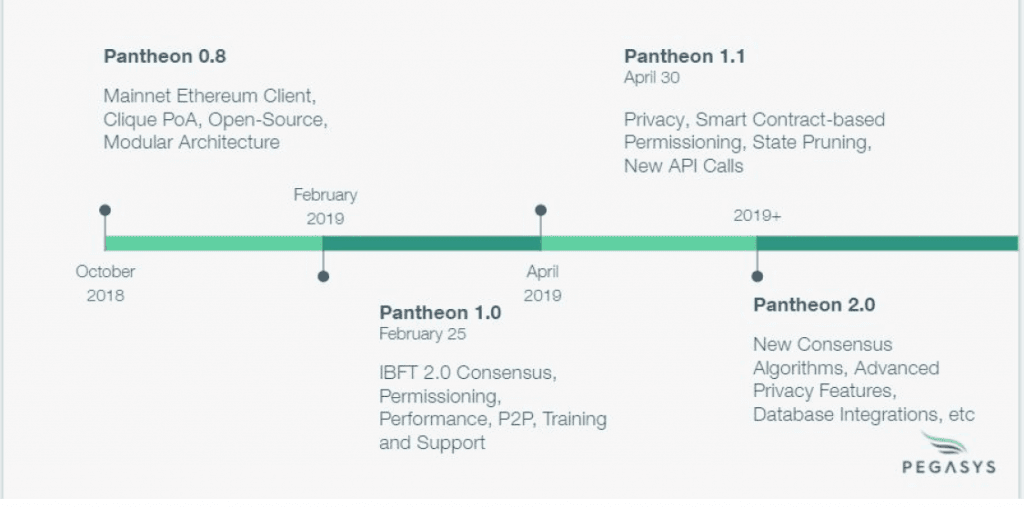
ConsenSys’ PegaSys Team Launches Pantheon Enterprise Ethereum Client
PegaSys, an engineering team for ConsenSys, has released a new client for enterprise-grade Ethereum networks: Pantheon 1.0.
You don’t need to wait for Casper for high-speed transactions on Ethereum. ConsenSys, the largest workshop for blockchain development, has released a new client specifically geared to facilitate enterprise and commercial adoption.
Dubbed Pantheon, the new software allows users to create their own blockchain networks, with tailor-made permission specifications. The client was developed by PegaSys, a 55-strong protocol engineering team under the ConsenSys umbrella.
Opening Ethereum For Business
The new offering is specifically aimed at finance, supply chain and other commercial industries, ConsenSys explained in a press release. Commercial blockchain development, or “Enterprise Ethereum,” is designed to pursue applications which would be ill-suited for the public mainnet.
“Over the past four years we’ve worked with customers around the world,” said Joseph Lubin, in a statement. “Whether central banks, industry consortiums, or Enterprise Ethereum Alliance working groups, we’ve been attentive to incorporating their feedback to create a truly enterprise ready Ethereum client: Pantheon.”

“Many industries require greater transaction throughput, privacy, and specialized validation features beyond what the Ethereum 1.0 base layer can presently offer,” Lubin continued. “This is the most accessible client to date, which will help enterprises reduce the cost of trust with external parties and create more collaborative infrastructure and cooperative business models going forward.”
“Pantheon can run in two modes: one to sync with the public net and one with the private net,” PegaSys’ head of Strategy and Business Development, Faisal Khan, told Crypto Briefing via email. He explained:
Private nets are a good starting point as they can provide higher throughput due to smaller size, can use consensus algo[rithm[s with finality, and be a testbed for new technologies like certain privacy techniques that might be costly on mainnet.
PegaSys says that Pantheon is designed to allow enterprises to control the permissioning and consensus of their own blockchain networks. Unlike the public Ethereum mainnet, the Pantheon client allows node and account whitelisting, allowing users to restrict their counterparties to trusted actors—allowing greater security for financial networks.
The new client also comes with greater privacy options. The first implementation of Pantheon, Khan says, “will work with the smart contracts developed by Aztec, to provide more scalable ZKPs [zero-knowledge proofs.” Later additions will provide tools for private transactions and privacy groups which are not available in today’s enterprise blockchains.
Scaling Towards Adoption
While mining secures public blockchains at the expense of speed, older clients for Enterprise Ethereum were able to gain higher throughput at the expense of network security, PegaSys explains on its website.
Unlike Quorum, the first client for Enterprise Ethereum, Pantheon uses a new consensus mechanism dubbed “Istanbul Byzantine Fault Tolerance 2.0,” allowing a more even tradeoff between security and speed.
Instead of competitive mining, new blocks must be signed by 66% of validator nodes in order to be added to the blockchain, with “leadership” rotated between nodes.
Khan explained:
“IBFT is a consensus algorithm that provides instant finality needed for enterprise use (no forks) while still preserving some decentralization. This is an improvement on PoA which is centralized. We expect Enterprise Ethereum to support some hundreds of transactions per second depending on the network size. IBFT makes a lot of sense for large, industry consortiums that want fast, scalable transactions without being centralized with a single party controlling the network.
In order to bootstrap the new networks, PegaSys is also partnering with DrumG Technologies to provide the first enterprise-grade distributed applications for the financial sector, using Pantheon as the blockchain protocol. “The privacy features and design of Pantheon enable a number of use cases where confidentiality is required in the banking sector,” said Marc Sparrow, DrumG’s chief architect.
PegaSys is also offering full customer support and training to ensure that clients will be able to successfully implement the enterprise-grade network. “Enterprise support will give our customers the confidence and assurance they need to run Pantheon and Enterprise Ethereum, and also help us roll out better features that enterprises need to get to production,” said PegaSys Program Director Daniel Heyman.
The new client is available in Azure Marketplace, or directly through Azure portal, through a partnership with Microsoft. Although some enterprises are looking at developing stablecoins for their private networks, there’s bad news for speculators: there won’t be a Pantheon token.
The author has investments in Ethereum which is mentioned in this article.
